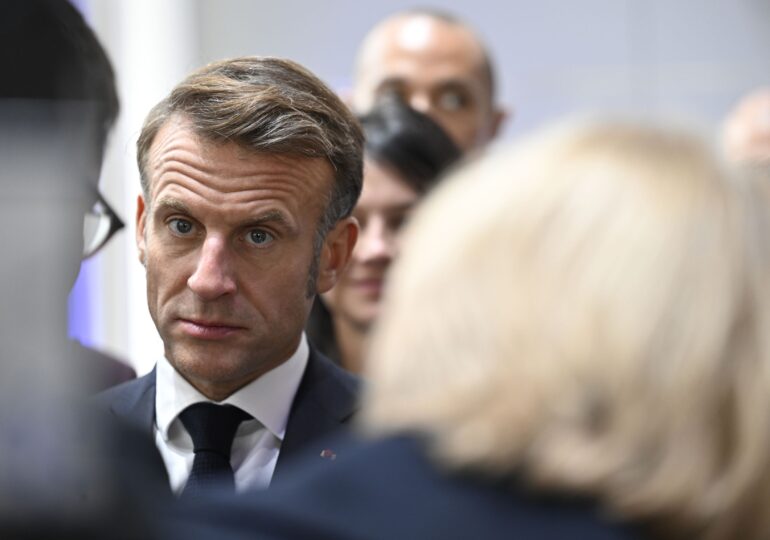Investors and governments no longer know what President Emmanuel Macron will do to manage the budget deficit and political crisis in France. This uncertainty deeply unsettles them.
Europe was already caught in a toxic mix of problems: the war sparked by Vladimir Putin in Ukraine, Donald Trump’s attack on global trade, and the rise of far-right populists across the continent.
Then, the French government collapsed again - this time after less than a day in office - causing panic in the markets due to the prospect of new elections that could bring the far right closer to power than ever before.
"France is too big to fail"
In Brussels and other European capitals, officials and diplomats have expressed fears that Emmanuel Macron's leadership on international issues such as Ukraine and Gaza will be severely weakened. Some even fear that the entire eurozone economy could be at risk.
"France is too big to fail, and this endless political instability jeopardizes the entire eurozone. It is the main topic of all office discussions today," said a diplomat from an EU state, quoted by Politico.
Rightly so: France is the second largest economy in the European Union, a G7 member, the EU's only nuclear power, and a permanent member of the UN Security Council. Under Macron, Paris has become a political force rivaling Germany in influence over European affairs.
Budget deadlock and the threat of the far right
Macron is trying to withstand Rassemblement National (RN), the far-right party led by Marine Le Pen, which consistently dominates polls, while also grappling with a huge budget deficit.
His successive governments have failed to garner parliamentary support for public spending cuts. The deepening deadlock increases the likelihood of early legislative elections by the end of the year, prolonging the uncertainty.
Some observers go even further, speculating about a possible resignation of Macron before the end of his term in 2027. Any of these scenarios would pave the way for RN's advancement and could shake the entire European political architecture, with unpredictable effects on the eurozone.
Markets react violently
On Monday, financial markets in France and beyond reacted with fear to the collapse, after just 14 hours, of the government led by Sébastien Lecornu. French stocks and bonds fell, and the euro depreciated against the dollar. The CAC 40 index lost 1.4%.
"There are already enough concerns about the eurozone economy. We didn't need this," said an official from a eurozone member country.
French authorities have tried to downplay the risks, stating that there is "a pilot in the cockpit" at the Ministry of Economy. But many analysts are not convinced.
"For the past eight years, Macron has been trying to present France as the most attractive place in Europe for investments. I don't see any serious investor choosing France now, in the complete absence of political and fiscal clarity," explained Grégoire Roos, program director at Chatham House.
Premature "eulogies" in Brussels
Some European diplomats are already privately drafting Macron's "political obituary." After his meteoric rise in 2017, the French president now appears as a weakened leader with diminishing influence in Brussels.
However, another EU diplomat spoke of Macron's "legacy" as a visionary thinker, the author of many ideas that have reshaped Europe. The concept of "strategic autonomy" - the desire for the EU to be more self-sufficient economically and militarily - was born in Paris and has gained relevance in the context of Trump's America's withdrawal.
"Few leaders think about what will happen in two or five years. Macron was one of them," said the diplomat.
Declining influence
Even though he has shown no signs of wanting to resign, internal disruptions will inevitably diminish Paris's influence in shaping European policies. Discussions on the EU budget, for example, would be easier to shape if France consistently sent the same minister to Brussels - an impossible task given the current personnel changes.
On the other hand, an early election could jeopardize the EU's long-term budget. National governments hoped to reach an agreement before the French elections in 2027 to prevent Le Pen from politicizing and blocking the process, explained a European official.
Macron, "lost in action"
Macron has been a central actor in supporting Ukraine and Europe's efforts to strengthen its defense through joint initiatives and coordination with allies. His partnership with British Prime Minister Keir Starmer, who seeks to form a "coalition of the willing" for a potential peace in Ukraine, is still the only concrete initiative of its kind.
"It is not good for the EU for one of its largest members to be in chaos, especially in the current security context," said the same official.
The Franco-German axis, the traditional engine of the Union, is now functioning with difficulty, even though the new German Chancellor, Friedrich Merz, is perceived as more energetic than his predecessor.
An official from the cabinet of a resigning minister admitted: "France is missing from the scene just as Russia advances in Europe, China floods the markets, and Trump's United States continues to mess up. France cannot offer what it should in these conditions."
Far-right, the big winner
If Macron triggers new elections, the far right could greatly benefit, even if RN has been stagnant at 30-32% in polls for months.
Le Pen has already welcomed the victory of populist Andrej Babiš in the Czech elections and has renewed calls for a new election in France.
And Geert Wilders, the Dutch far-right leader, recently warned: "The time of old leaders, including Macron, is over."
G.P.

